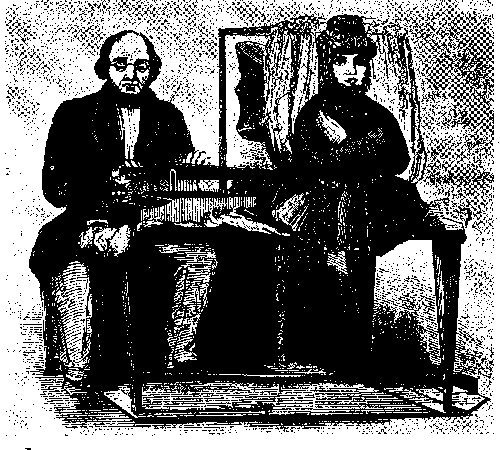 I paid
my shilling and was shown into a large room, half filled with boxes and
lumber, and badly lighted with lamps. In the centre was a box on a table,
looking like a rough piano without legs and having two key-boards. This
was surmounted by a half-length weird figure, rather bigger than a full-grown
man, with an automaton head and face looking more mysteriously vacant
than such faceslook. Its mouth was large, and opened like the eyes of
Gorgibuster in the pantomime, disclosing artificial gums, teeth, and all
the organs of speech. There was no lecturer, no lecture, no music - none
of the usual adjuncts of a show. The exhibitor, Professor Faber, was a
sad-faced man, dressed in respectable well-worn clothes that were soiled
by contact with tools, wood, and machinery. The room looked like a laboratory
and workshop, which it was. The Professor was not too clean, and his hair
and beard sadly wanted the attention of a barber. I have no doubt that
he slept in the same room as his figure - his scientific Frankenstein
monster - and I felt the secret influence of an idea that the two were
destined to live and die together. The Professor, with a slight German
accent, put his wonderful toy in motion. He explained its action: it was
not necessary to prove the absence of deception. One keyboard, touched
by the Professor, produced words which. slowly and deliberately in a hoarse
sepulchral voice came from the mouth of the figure, as if from the depths
of a tomb. It wanted little imagination to make the very few visitors
believe that the figure contained an imprisoned human - or half human
- being, bound to speak slowly when tormented by the unseen power outside.
No one thought for a moment that they were being fooled by a second edition
of the "Invisible Girl" fraud. There were truth, laborious invention,
and good faith, in every part of the melancholy room. As a crowning display,
the head sang a sepulchral version of "God save the Queen," which suggested
inevitably, God save the inventor. This extraordinary effect was achieved
by the Professor working two keyboards - one for the words, and one for
the music. Never probably, before or since, has the National Anthem been
so sung. Sadder and wiser, I, and the few visitors, crept slowly from
the place, leaving the professor with his one and only treasure - his
child of infinite labour and unmeasurable sorrow. I paid
my shilling and was shown into a large room, half filled with boxes and
lumber, and badly lighted with lamps. In the centre was a box on a table,
looking like a rough piano without legs and having two key-boards. This
was surmounted by a half-length weird figure, rather bigger than a full-grown
man, with an automaton head and face looking more mysteriously vacant
than such faceslook. Its mouth was large, and opened like the eyes of
Gorgibuster in the pantomime, disclosing artificial gums, teeth, and all
the organs of speech. There was no lecturer, no lecture, no music - none
of the usual adjuncts of a show. The exhibitor, Professor Faber, was a
sad-faced man, dressed in respectable well-worn clothes that were soiled
by contact with tools, wood, and machinery. The room looked like a laboratory
and workshop, which it was. The Professor was not too clean, and his hair
and beard sadly wanted the attention of a barber. I have no doubt that
he slept in the same room as his figure - his scientific Frankenstein
monster - and I felt the secret influence of an idea that the two were
destined to live and die together. The Professor, with a slight German
accent, put his wonderful toy in motion. He explained its action: it was
not necessary to prove the absence of deception. One keyboard, touched
by the Professor, produced words which. slowly and deliberately in a hoarse
sepulchral voice came from the mouth of the figure, as if from the depths
of a tomb. It wanted little imagination to make the very few visitors
believe that the figure contained an imprisoned human - or half human
- being, bound to speak slowly when tormented by the unseen power outside.
No one thought for a moment that they were being fooled by a second edition
of the "Invisible Girl" fraud. There were truth, laborious invention,
and good faith, in every part of the melancholy room. As a crowning display,
the head sang a sepulchral version of "God save the Queen," which suggested
inevitably, God save the inventor. This extraordinary effect was achieved
by the Professor working two keyboards - one for the words, and one for
the music. Never probably, before or since, has the National Anthem been
so sung. Sadder and wiser, I, and the few visitors, crept slowly from
the place, leaving the professor with his one and only treasure - his
child of infinite labour and unmeasurable sorrow.
John Hollingshead, My Lifetime, 2 Vols (London: Sampson, Low, Marston & Co., 1895), Vol 1, pp. 67-9. |